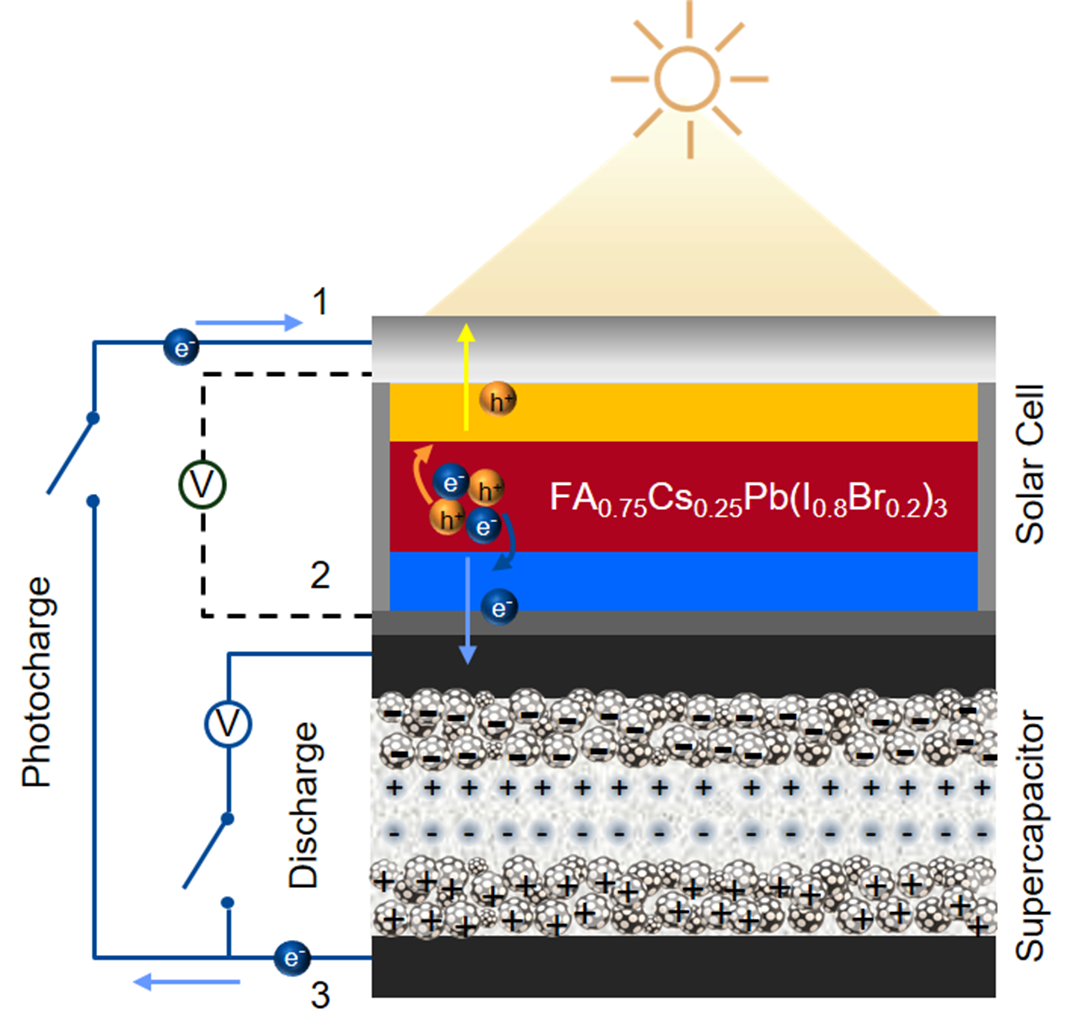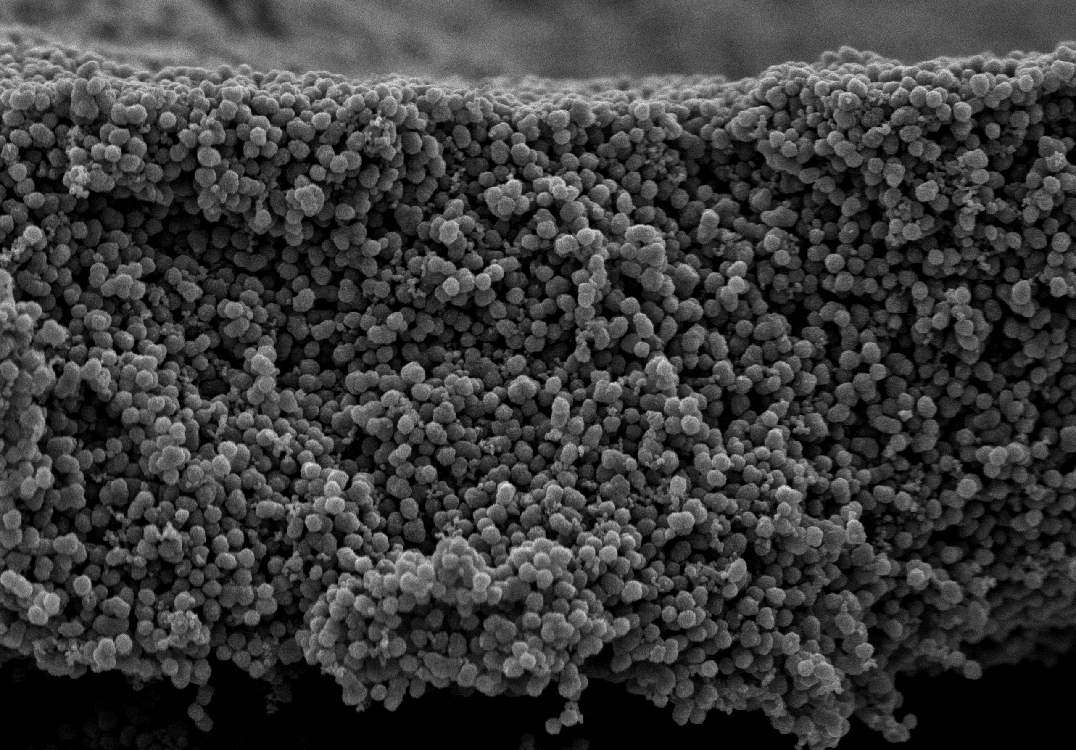News & Press
Supplying Sustainable Technologies and Sensors Reliably with Energy
Freiburg researchers develop supercapacitor with integrated solar cell

The Photosupercapacitor can harvest, convert, store and deliver solar energy on demand in a single, compact system. Source: Fischer Lab
Smart homes, autonomous vehicles, virtual assistance systems: connected, intelligent devices and sensors – also known as the Internet of Things – are increasingly finding their way into private households and production facilities. This requires the development of reliable energy systems that have less impact on the environment and cost less than conventional batteries. A solution could be photosupercapacitors that harvest, convert, store and deliver solar energy on demand in a single, compact system. Researchers from the Cluster of Excellence Living, Adaptive and Energy-autonomous Materials Systems (livMatS) at the University of Freiburg have succeeded in developing such a photosupercapacitor with an integrated perovskite solar cell. The team around Dr. Taisiia Berestok, Prof. Dr. Anna Fischer, Christian Diestel and Prof. Dr. Stefan Glunz published their results in the scientific journal Solar RRL.
System with three electrodes
To date, combined solar and storage systems are usually built in a modular fashion: A solar cell is wired to a separate electrochemical storage device, either a supercapacitor or a battery. A total of four electrodes are used – two for energy generation and two for storage. Such systems require complex wiring and take up a lot of space, which reduces the overall energy and power density.

Cross section of the supercapacitor electrode. Source: Fischer Lab
In contrast, the integrated photosupercapacitor developed by the Freiburg research team requires only three electrodes, which is due to the fact that it has a shared graphite foil electrode integrated between the supercapacitor and the solar cell. The gel electrolyte supercapacitor used is based on a novel electrode material, so-called N-doped carbon nanospheres (MPNC), which are porous and thus have a very large surface area and hence contact area with the electrolyte where the light-generated charge carriers are stored particularly well. "The MPNC nanospheres are optimally designed for the charge storage processes on all length scales and can be easily and reproducibly processed into electrodes", explains Prof. Dr. Anna Fischer.
Photosupercapacitor achieves efficiency of 11.5 percent
As such, the novel gel electrolyte supercapacitor can achieve power densities of up to 14.8 kW/kg (11 mW/cm2) at energy densities of up to 13.8 Wh/kg (10.4 µWh/cm2), and the integrated photosupercapacitors can achieve power densities of up to 2.2 mW/cm2 at energy densities of up to 4.27 µWh/cm2. Thanks to the perovskite solar cell, a fast charging of less than five seconds up to one volt is possible – a voltage that a silicon solar cell would not achieve. "Due to the high efficiency of the MPNC supercapacitor and the perovskite solar cell, the integrated photosupercapacitor achieves an unprecedented overall efficiency of 11.5 percent", says Prof. Dr. Stefan Glunz.
Original publication:
Berestok, T., Diestel, C., Ortlieb, N., Büttner, J., Matthews, J., Schulze, P. S., Goldschmidt, J., Glunz, S. W., & Fischer, A. (2021). High‐Efficiency Monolithic Photosupercapacitor – A Smart Integration of a Perovskite Solar Cell with a Mesoporous Carbon Double‐Layer Capacitor. DOI: https://doi.org/10.1002/solr.202100662
Contact:
Prof. Dr. Anna Fischer
Institute for Inorganic and Analytical Chemistry and
Cluster of Excellence Living, Adaptive and Energy-autonomous Materials Systems (livMatS)
University of Freiburg
Email: anna.fischer@ac.uni-freiburg.de
Tel.: 0761/203-8717
Prof. Dr. Stefan Glunz
Department of Sustainable Systems Engineering – INATECH and
Cluster of Excellence Living, Adaptive and Energy-autonomous Materials Systems (livMatS)
University of Freiburg and
Fraunhofer Institute for Solar Energy Systems ISE
Email: stefan.glunz@ise.fraunhofer.de
Tel.: 0761/4588-5191
Sonja Seidel
Science Communication
Cluster of Excellence Living, Adaptive and Energy-autonomous Materials Systems (livMatS)
University of Freiburg
Email: sonja.seidel@livmats.uni-freiburg.de
Tel.: 0761/203-95361
